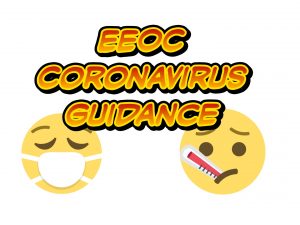As coronavirus fears continue to spread throughout the country, workplaces are struggling to decide how to prevent possible outbreaks in their work forces. Indeed, Seattle based tech giants Amazon, Google, Facebook, and Microsoft are closing offices and asking employees to work from home. But, discussions about employees’ medical conditions necessarily invokes concerns about disability discrimination statutes, such as the Americans with Disabilities Act (ADA) and the Rehabilitation Act.
The federal government’s Equal Employment Opportunity Commission (EEOC) has issued guidance to help employers navigate the tricky waters of combating the spread of coronavirus while remaining compliant with anti-discrimination laws. Today’s Long Island employment law blog discusses the EEOC’s guidance.
Preliminarily, the EEOC noted that while disability discrimination laws remain in effect and employers must follow these laws, the laws do not stop employers from following the CDC’s guidelines for employers. The CDC’s guidelines include encouraging sick employees to stay home, separating sick employees upon arrival to the workplace, and reminding employees to use appropriate proper hygiene.
In conjunction with the CDC’s guide, the EEOC refers employers to its flu pandemic preparedness guidance issued in October 2009. One of the issues coronavirus raises is what degree of inquiry can an employer make about an employee’s medical conditions. The ADA prohibits employers from making disability-related inquiries. Since not all medical conditions constitute disabilities under the ADA, not all inquiries about an employee’s medical status is a disability-related inquiry. The guidelines suggest that if an employer asks about an employee’s symptoms of a cold or a seasonal flu, the questions would not likely elicit information about a disability. This is so because a cold or flu is not a disability under the ADA. Some state laws, however, are broader than federal law and a cold or flu may be a disability under those laws.
Another issue raised by coronavirus is the direct threat exception to the ADA. Employees who pose a direct threat to the health and safety of that employee or others is not protected by the ADA. The harm must be incapable of being reduced or eliminated with a reasonable accommodation. Most important, invoking the direct threat exception cannot be done based on subjective perceptions or irrational fears. The decision to identify an employee’s condition as a direct threat must be made after making an individualized assessment of the employee’s risk using a four factor test.
In other words, an employment policy which says that any employee who coughs must be sent home and which is implemented based on a fear that any such employees have coronavirus, would likely not meet the requirements for using the direct threat exception. Employers must evaluate each employee who coughs because the employee might be choking or may just have a tickle in his throat, and not the coronavirus.
The coronavirus, however, may or may not be considered a direct threat. Seasonal flus and colds are generally not considered severe enough to be direct threats under the ADA. The EEOC suggests employers monitor the CDC and local authorities for guidance on whether a seasonal flu reaches a level of severity. Similarly for coronavirus, employers should monitor the various public health agencies’ assessment of the virus. If the virus is considered as severe as a seasonal flu, it likely is not a direct threat. If the assessment increases and the virus is considered more severe, it may reach the direct threat level.
The issues concerning coronavirus and the workplace are complex and evolving. The issues implicate many intersecting laws and practical concerns. Employers should not rely solely on blogs and news reports to develop policies to respond to the coronavirus threat in a workplace. Employers should consult with experienced employment attorneys to review the complexities involved with coronavirus and workplace rules.
If you have questions about the ADA or New York State disability discrimination laws, and coronavirus in the workplace, contact a Long Island employment lawyer at 631-352-0050. More information about disability discrimination is available at our website at http://linycemploymentlaw.com.
This blog is a mere overview of the CDC and EEOC guidelines and is not provided as legal advice. When considering workplace policies concerning coronavirus, employers should fully review the primary source documents, applicable laws and regulations, and consult with an attorney.

Coronavirus and workplace laws
 Long Island Employment Law Blog
Long Island Employment Law Blog

